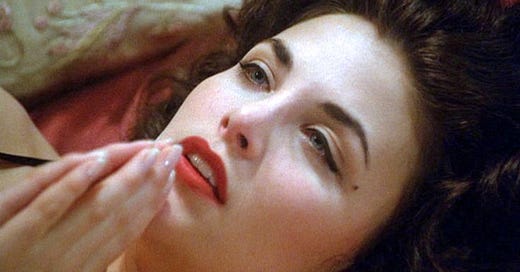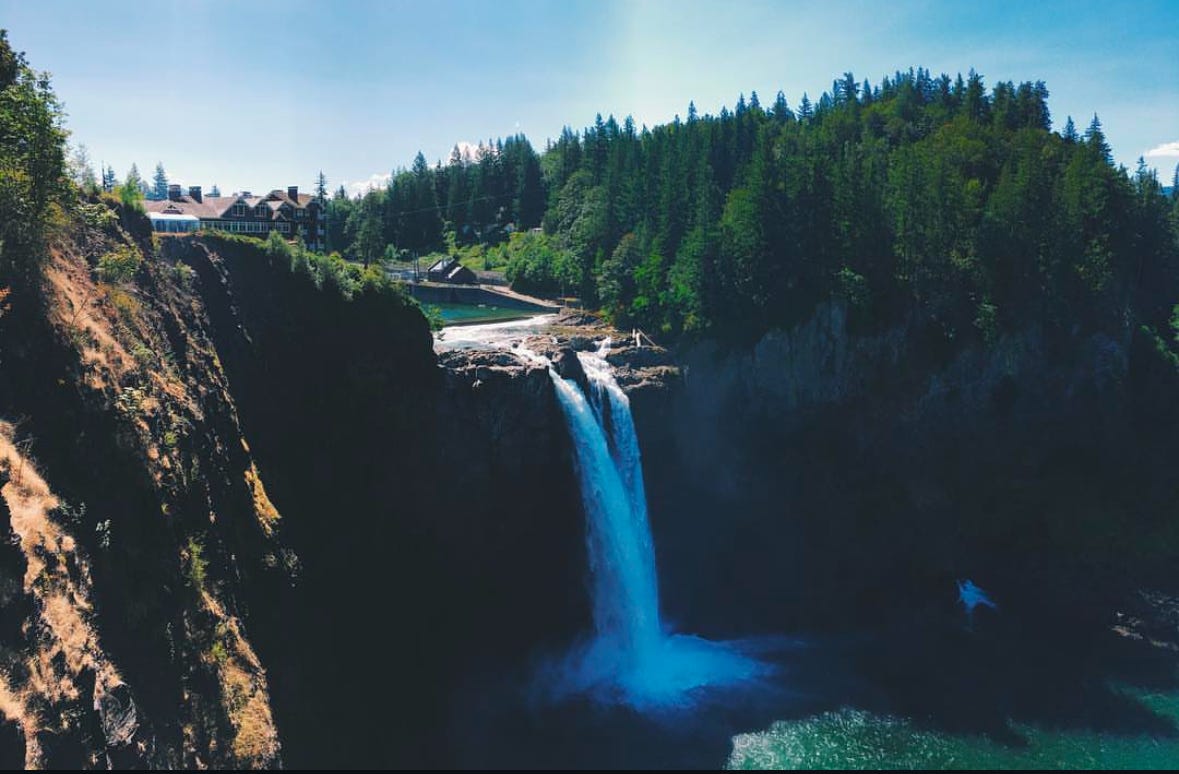The first time I watched Twin Peaks was the summer of 2016. I was 22, which feels a little late. I grew up without a TV and I had no real cause or avenue then to learn about film or music or old pop culture. The only art class I ever took was community college art history, where I learned about chiaroscuro and the Mezquita de Córdoba. Advanced things like David Lynch or the Velvet Underground or whatever kids with cool parents got into were beyond me. I wasn’t even on Tumblr.
That summer I also dropped out of grad school. The money in my bank account was running out and I had to find a job to pay rent for the moldy basement in the house I lived in with five other girls. I had failed pretty spectacularly - not for the first or last time - but in a way that was so immediate I knew I could not think too much about my circumstances or else I would get depressed. I could not afford to get depressed. Instead, I woke up every morning on automatic, sent out twenty resumes on Indeed.com and then drove up to Snoqualmie Ridge to babysit for some extra cash. Snoqualmie Ridge is where they filmed a lot of Twin Peaks. The big mountain you see behind the Twin Peaks sign. The lodge by the waterfall. All real, all about a forty-minute drive east of Seattle.
Washington state is beautiful in the summer. All the Pacific Northwest is. In midsummer the sun is so searing it illuminates every ragged ridge and yellow field in full, clear technicolor, yet even in the dry air everything remains lush and green. The mountains loom like distant shelters from the heat, raw and untamed and terrifying. In those days we were just beginning to receive yearly wildfire smoke from Canada, which would hang for weeks like a coat over the cities and farms and would turn all the light hazy and my mind hazy too. But that summer was still clear and parched. Every morning I would drive to the Ridge from Seattle, and every evening I would drive back, chasing the sunset and willing myself not to think. Willing myself to focus on the task at hand.
It was during this time that I started watching Twin Peaks. My friend put it on one night and I stayed transfixed, the story and its spirit blending into my matching real life, the same environment I sank into every day, holding me in its thrall and keeping my mind from other, worse things. At first, I couldn’t figure out the tone. Was it ironic or sincere? When Pete talked about the fish in the percolator, when Agent Cooper ordered coffee, when Nadine complained about the blinds, when Bobby got mad at his dad. The only thing I knew was that there was something to figure out. Something under the surface, some intention of Lynch’s to interpret, something that eluded me.
One day toward the end of the summer I took the wrong exit home and ended up on a side road in the country instead of the main highway back to Seattle. After ten minutes of driving, I passed through a small town - the kind with roadside fruit stands and old-timey gas stations just like in Twin Peaks - and saw two men walking on the blacktop under the shadow of the Ridge. Walking side by side with their khakis on and their dress-shirt sleeves rolled up in the heat. It took me only a second to realize who they were: my ministers, an hour east of where they should have been. I pulled over and grabbed my phone to call one of them. I remember feeling embarrassed. My hair was greasy and I was wearing yoga pants and an oversized t-shirt, dressed not at all like an upstanding church girl. When I found them, they didn’t seem to notice my appearance. We sat on a bench by the creek and talked for a long while. The older one was awkward around people. He stood with his hands clasped behind his back, staring out at the running water while I spoke with his younger companion, whom I had always felt was a kindred spirit. The younger man was nervous and didn’t fit in with his peers. He had always been kind to me. I don’t remember what we talked about.
As I drove home, I let myself hope a little. I wondered if there had been any spiritual significance to our meeting. I was sure there had to be something there, just as I was sure there had to be something under the surface of Twin Peaks, but as I went over all the things we talked about I could find no sign or evidence of the purpose I sought. No path opening, no obvious calling or clear direction. Just a conversation about nothing. Do you ever want something so badly it hurts even to think of it? That is how I felt about purpose that summer. I could not think of it, I could not pray for it, I could do nothing but act and give my heart over to an animal numb.
Likewise the Spirit also helpeth our infirmities: for we know not what we should pray for as we ought. But the Spirit itself maketh intercession for us with groanings which cannot be uttered. Purpose requires strength, strength requires healing, and healing only begins when we allow ourselves to receive comfort. Before the numb could fall over me again, a voiceless Speaker planted these words in my heart: “I have not forgotten you.”
In the beginning, I thought Audrey Horne was a stereotype: a bratty beauty we were supposed to like, as if being bratty was enough to be likable. Desirable to men in the way we are told brainless women are. The tropes of my youth put me off and I wondered what Lynch wanted us to think of her. Little by little, he revealed all. Her sensitivity. Her need and her yearning, how she was filled with desire just as I was. How she prayed as I did, or used to. Those infatuations. Her desire to be known and seen, in spite of her best efforts to hide. The pleasure of being good. The archness, the deflection, the pretending, the defeat of pretense. No one to tell her secrets to, and all of a sudden someone to pray to, to save her, to know her as she truly was. That is the marvel of Lynch. Even in profound darkness, every time you expect a turn to the cynical, he doubles back and drives sincerity straight into your heart.
The actresses who played Lynch’s roles have said the same thing about him since he died: that Lynch saw something in them no one else did. Something that even they were incapable of seeing in themselves when they met him. David Lynch saw and loved women as they were. He saw their humanity - that same need for goodness that strikes the heart of all people. But he went far beyond that. I have long felt that the most beautiful kind of love does not simply stop at accepting all flaws, but continues into seeing a capacity for goodness, seeing and believing in the best possible future for the object of its focus. The best kind of love is redemptive, and Lynch had that kind of love for women. Lynch had that kind of love for everyone. In his portrayal of families, I see an understanding of the stakes of tragedy, an honoring of the profound grief that accompanies the desecration of something that should be good. He saw that there was something to celebrate, that there was something to mourn, that people are weak in the face of obliterating evil and that they desperately need to be made whole again. That the greatest form of love is a love that believes in wholeness. Major Briggs (my favorite character) conveys this love plainly as he tells his son of a beautiful, harmonious vision: “I awoke with a tremendous amount of optimism and confidence in you and your future. That was my vision: it was of you.”
David Lynch’s death has caused my past to reveal itself to me like a jewel. I keep having visions of comfort. My grandpa carrying me outside after a storm to see that it was over. My uncle rocking me to sleep after a nightmare. The two men I saw walking on the side of the road that day driving back from Snoqualmie, back when I hid my heart, back when I could not have dreamed of crying out to God, and God in His great and unknowable mercy saw my deepest need and comforted me anyway. There in the grace of God go I. There in the grace of Lynch goes Audrey.






beautiful — i went up to North Bend and Snoqualmie a few days ago, and they had a wonderful makeshift memorial to David Lynch outside of the diner. Cigarettes, donuts, lovely handwritten notes thanking David. You would have appreciated it. I really appreciate this piece — thank you for writing it
I don't really have much to say other than that this was the best piece I've read all year. Thank you so much for writing and sharing it with us.